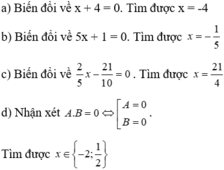Giải các phương trình sau: x + 1 x - 1 - x - 1 x + 1 = 16 x 2 - 1
Hãy nhập câu hỏi của bạn vào đây, nếu là tài khoản VIP, bạn sẽ được ưu tiên trả lời.


a) \(\dfrac{2}{x-3}+\dfrac{x-5}{x-1}=1\)
\(\Leftrightarrow\dfrac{2\left(x-1\right)+\left(x-5\right)\left(x-3\right)}{\left(x-3\right)\left(x-1\right)}=1\)
\(\Leftrightarrow2\left(x-1\right)+\left(x-5\right)\left(x-3\right)=\left(x-3\right)\left(x-1\right)\)
\(\Leftrightarrow2x-2+x^2-8x+15-x^2+4x-3=0\)
\(\Leftrightarrow-2x+10=0\) \(\Leftrightarrow x=5\)
b) \(\dfrac{x+1}{x-1}-\dfrac{x-1}{x+1}=\dfrac{16}{x^2-1}\) (2)
Ta có \(x^2-1=\left(x-1\right)\left(x+1\right)\)
ĐKXĐ: \(x^2-1\ne0\Leftrightarrow x\ne\pm1\)
(2) \(\Leftrightarrow\dfrac{\left(x+1\right)^2-\left(x-1\right)^2-16}{x^2-1}=0\)
mà \(x^2-1\ne0\) để phương trính có nghĩa
\(\Leftrightarrow\left(x+1\right)^2=\left(x-1\right)^2-16=0\)
\(\Leftrightarrow x^2+2x+1-x^2+2x-1-16=0\)
\(\Leftrightarrow4x-16=0\) \(\Leftrightarrow x=4\)

1.
PT $\Leftrightarrow 2^{x^2-5x+6}+2^{1-x^2}-2^{7-5x}-1=0$
$\Leftrightarrow (2^{x^2-5x+6}-2^{7-5x})-(1-2^{1-x^2})=0$
$\Leftrightarrow 2^{7-5x}(2^{x^2-1}-1)-(2^{x^2-1}-1)2^{1-x^2}=0$
$\Leftrightarrow (2^{x^2-1}-1)(2^{7-5x}-2^{1-x^2})=0$
$\Rightarrow 2^{x^2-1}-1=0$ hoặc $2^{7-5x}-2^{1-x^2}=0$
Nếu $2^{x^2-1}=1\Leftrightarrow x^2-1=0$
$\Leftrightarrow x^2=1\Leftrightarrow x=\pm 1$
$2^{7-5x}-2^{1-x^2}=0$
$\Leftrightarrow 7-5x=1-x^2\Leftrightarrow x^2-5x+6=0$
$\Leftrightarrow (x-2)(x-3)=0\Leftrightarrow x=2; x=3$
2. Đặt $\sin ^2x=a$ thì $\cos ^2x=1-a$. PT trở thành:
$16^a+16^{1-a}=10$
$\Leftrightarrow 16^a+\frac{16}{16^a}=10$
$\Leftrightarrow (16^a)^2-10.16^a+16=0$
Đặt $16^a=x$ thì:
$x^2-10x+16=0$
$\Leftrightarrow (x-2)(x-8)=0$
$\Leftrightarrow x=2$ hoặc $x=8$
$\Leftrightarrow 16^a=2$ hoặc $16^a=8$
$\Leftrightarrow 2^{4a}=2$ hoặc $2^{4a}=2^3$
$\Leftrightarroww 4a=1$ hoặc $4a=3$
$\Leftrightarrow a=\frac{1}{4}$ hoặc $a=\frac{3}{4}$
Nếu $a=\frac{1}{4}\Leftrightarrow \sin ^2x=\frac{1}{4}$
$\Leftrightarrow \sin x=\pm \frac{1}{2}$
Nếu $a=\sin ^2x=\frac{3}{4}\Rightarrow \sin x=\pm \frac{\sqrt{3}}{2}$
Đến đây thì đơn giản rồi.

\(a,\dfrac{x-3}{x}=\dfrac{x-3}{x+3}\)\(\left(đk:x\ne0,-3\right)\)
\(\Leftrightarrow\dfrac{x-3}{x}-\dfrac{x-3}{x+3}=0\)
\(\Leftrightarrow\dfrac{\left(x-3\right)\left(x+3\right)-x\left(x-3\right)}{x\left(x+3\right)}=0\)
\(\Leftrightarrow x^2-9-x^2+3x=0\)
\(\Leftrightarrow3x-9=0\)
\(\Leftrightarrow3x=9\)
\(\Leftrightarrow x=3\left(n\right)\)
Vậy \(S=\left\{3\right\}\)
\(b,\dfrac{4x-3}{4}>\dfrac{3x-5}{3}-\dfrac{2x-7}{12}\)
\(\Leftrightarrow\dfrac{4x-3}{4}-\dfrac{3x-5}{3}+\dfrac{2x-7}{12}>0\)
\(\Leftrightarrow\dfrac{3\left(4x-3\right)-4\left(3x-5\right)+2x-7}{12}>0\)
\(\Leftrightarrow12x-9-12x+20+2x-7>0\)
\(\Leftrightarrow2x+4>0\)
\(\Leftrightarrow2x>-4\)
\(\Leftrightarrow x>-2\)

a) \(3x-2\sqrt{x-1}=4\) (ĐK: x ≥ 1)
\(\Rightarrow3x-2\sqrt{x-1}-4=0\)
\(\Rightarrow3x-6-2\sqrt{x-1}+2=0\)
\(\Rightarrow3\left(x-2\right)-2\left(\sqrt{x-1}-1\right)=0\)
\(\Rightarrow3\left(x-2\right)-2.\dfrac{x-2}{\sqrt{x-1}+1}=0\)
\(\Rightarrow\left(x-2\right)\left[3-\dfrac{2}{\sqrt{x-1}+1}\right]=0\)
*TH1: x = 2 (t/m)
*TH2: \(3-\dfrac{2}{\sqrt{x-1}+1}=0\)
\(\Rightarrow3=\dfrac{2}{\sqrt{x-1}+1}\)
\(\Rightarrow3\sqrt{x-1}+3=2\)
\(\Rightarrow3\sqrt{x-1}=-1\) (vô lí)
Vậy S = {2}
b) \(\sqrt{4x+1}-\sqrt{x+2}=\sqrt{3-x}\) (ĐK: \(-\dfrac{1}{4}\le x\le3\) )
\(\Rightarrow\sqrt{4x+1}-3-\sqrt{x+2}+2-\sqrt{3-x}+1=0\)
\(\Rightarrow\dfrac{4x-8}{\sqrt{4x+1}+3}-\dfrac{x-2}{\sqrt{x+2}+2}+\dfrac{x-2}{\sqrt{3-x}+1}=0\)
\(\Rightarrow\left(x-2\right)\left(\dfrac{4}{\sqrt{4x+1}+3}-\dfrac{1}{\sqrt{x+2}+2}+\dfrac{1}{\sqrt{3-x}+1}\right)=0\)
=> x = 2
\(a,3x-2\sqrt{x-1}=4\left(x\ge1\right)\\ \Leftrightarrow-2\sqrt{x-1}=4-3x\\ \Leftrightarrow4\left(x-1\right)=16-24x+9x^2\\ \Leftrightarrow9x^2-28x+20=0\\ \Leftrightarrow\left(x-2\right)\left(9x-10\right)=0\\ \Leftrightarrow\left[{}\begin{matrix}x=2\left(tm\right)\\x=\dfrac{10}{9}\left(tm\right)\end{matrix}\right.\)
\(b,\sqrt{4x+1}-\sqrt{x+2}=\sqrt{3-x}\left(-\dfrac{1}{4}\le x\le3\right)\\ \Leftrightarrow4x+1+x+2-2\sqrt{\left(4x+1\right)\left(x+2\right)}=3-x\\ \Leftrightarrow-2\sqrt{\left(4x+1\right)\left(x+2\right)}=2-6x\\ \Leftrightarrow\sqrt{4x^2+9x+2}=3x-1\\ \Leftrightarrow4x^2+9x+2=9x^2-6x+1\\ \Leftrightarrow5x^2-15x-1=0\\ \Leftrightarrow\Delta=225+20=245\\ \Leftrightarrow\left[{}\begin{matrix}x=\dfrac{15-\sqrt{245}}{10}=\dfrac{15-7\sqrt{5}}{10}\left(ktm\right)\\x=\dfrac{15+\sqrt{245}}{10}=\dfrac{15+7\sqrt{5}}{10}\left(tm\right)\end{matrix}\right.\Leftrightarrow x=\dfrac{15+7\sqrt{5}}{10}\)

2:
\(A=\dfrac{x_2-1+x_1-1}{x_1x_2-\left(x_1+x_2\right)+1}\)
\(=\dfrac{3-2}{-7-3+1}=\dfrac{1}{-9}=\dfrac{-1}{9}\)
B=(x1+x2)^2-2x1x2
=3^2-2*(-7)
=9+14=23
C=căn (x1+x2)^2-4x1x2
=căn 3^2-4*(-7)=căn 9+28=căn 27
D=(x1^2+x2^2)^2-2(x1x2)^2
=23^2-2*(-7)^2
=23^2-2*49=431
D=9x1x2+3(x1^2+x2^2)+x1x2
=10x1x2+3*23
=69+10*(-7)=-1

Thấy : \(x^2-4x+16=\left(x-2\right)^2+12>0\forall x\)
P/t \(\Leftrightarrow2\left(x^2-4x+16\right)-36+\sqrt{x^2-4x+16}=0\)
Đặt \(t=\sqrt{x^2-4x+16}>0\) ; khi đó :
\(2t^2+t-36=0\) \(\Leftrightarrow\left[{}\begin{matrix}t=4\\t=-\dfrac{9}{2}\left(L\right)\end{matrix}\right.\)
Với t = 4 hay \(\sqrt{x^2-4x+16}=4\Leftrightarrow x^2-4x=0\)
\(\Leftrightarrow\left[{}\begin{matrix}x=0\\x=4\end{matrix}\right.\)
Vậy ...

1: Ta có: \(\dfrac{5x^2-12}{x^2-1}+\dfrac{3}{x-1}=\dfrac{5x}{x+1}\)
\(\Leftrightarrow\dfrac{5x^2-12}{\left(x-1\right)\left(x+1\right)}+\dfrac{3x+3}{\left(x-1\right)\left(x+1\right)}=\dfrac{5x^2-5x}{\left(x+1\right)\left(x-1\right)}\)
Suy ra: \(5x^2+3x-9=5x^2-5x\)
\(\Leftrightarrow8x=9\)
hay \(x=\dfrac{9}{8}\left(tm\right)\)
2: Ta có: \(\dfrac{3}{x-5}-\dfrac{15-3x}{x^2-25}=\dfrac{3}{x+5}\)
\(\Leftrightarrow\dfrac{3x+15}{\left(x-5\right)\left(x+5\right)}+\dfrac{3x-15}{\left(x-5\right)\left(x+5\right)}=\dfrac{3x-15}{\left(x+5\right)\left(x-5\right)}\)
Suy ra: \(6x=3x-15\)
\(\Leftrightarrow3x=-15\)
hay \(x=-5\left(loại\right)\)
2. ĐKXĐ: $x\neq \pm 5$
PT \(\Leftrightarrow \frac{3}{x-5}+\frac{3x-15}{x^2-25}=\frac{3}{x+5}\)
\(\Leftrightarrow \frac{3}{x-5}+\frac{3(x-5)}{(x-5)(x+5)}=\frac{3}{x+5}\)
\(\Leftrightarrow \frac{3}{x-5}+\frac{3}{x+5}=\frac{3}{x+5}\Leftrightarrow \frac{3}{x-5}=0\) (vô lý)
Vậy pt vô nghiệm.

ĐKXĐ:
Ta có:
⇔ 4x = 16 ⇔ x = 4.
Vây phương trình đã cho có nghiệm x = 4.